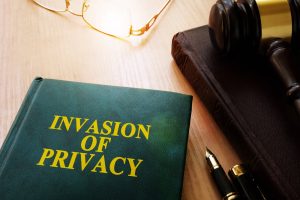 As technology advances, so does the scope of what’s considered an invasion of privacy. As a result, the courts grapple with many cases involving allegations of invasion of privacy, and the laws governing them continue evolving. Victims of invasion of privacy have the right to file a lawsuit seeking compensation for their losses due to the breach of privacy.
As technology advances, so does the scope of what’s considered an invasion of privacy. As a result, the courts grapple with many cases involving allegations of invasion of privacy, and the laws governing them continue evolving. Victims of invasion of privacy have the right to file a lawsuit seeking compensation for their losses due to the breach of privacy.
If you believe you experienced an invasion of privacy, contact an attorney. An experienced invasion of privacy lawyer knows the law that protects you, what constitutes an invasion of privacy, and how to take action. At Wallace Miller, our invasion of privacy attorneys are well-versed in the laws that protect your right to privacy, and we will work hard to help you pursue damages for any harm suffered.
The Legal Definition of Invasion of Privacy
The Illinois Supreme Court recognizes invasion of privacy as a tort, one that the case of Lawlor v. North American Corporation of Illinois recognized. In this case, the court noted the tort of “intrusion upon seclusion,” which protects against a person intruding on another’s private affairs. In this case, a private investigation agency hired someone to act as Lawlor to access her telephone records. The Illinois Supreme Court ultimately held that the agency invaded privacy and awarded Lawlor damages.
The court’s decision cited the Restatement of the Law, Second, Torts, § 652: “One who intentionally intrudes, physically or otherwise, upon the solitude or seclusion of another or his private affairs or concerns, is subject to liability to the other for invasion of his privacy if the intrusion would be highly offensive to a reasonable person.” This is the accepted legal definition of invasion of privacy in Illinois today.
Types of Invasion of Privacy
Invasions of privacy occur when someone invades another person’s privacy rights without permission or consent. Invasion of privacy lawsuits fall under four categories:
Appropriation of Name or Likeness
Appropriation of Name or Likeness claims protects a person’s right to control the use of their identity for a business or economic purpose. These laws typically prohibit people from using someone else’s name, likeness, or identity in a way implying the person’s association with or endorsement of the product or service without that person’s permission.
Generally, the elements of an appropriation claim include:
- Someone used the person’s name, likeness, or identity.
- They used it for their benefit, regardless of whether the benefit was economic or otherwise.
- The person did not consent to their using it.
- Their use of it injured the person.
This type of invasion of privacy lawsuit may apply if a defendant uses someone’s identity without permission for their benefit, such as companies using a celebrity’s name or likeness on their products without permission.
Intrusion Upon Seclusion
Intrusion upon seclusion laws protects people’s right to privacy while in solitude or seclusion. This law applies when someone intrudes into someone else’s private affairs without consent. For a claim of intrusion upon seclusion to be successful, all four of the following elements must be present:
- Someone intentionally intruded into your private affairs.
- A reasonable person would find the intrusion highly offensive.
- The defendant didn’t really need to tell others what they saw or heard during the intrusion.
- The intrusion caused you suffering.
Examples of intrusion upon seclusion include peeking through someone’s windows, taking pictures of someone in their home, or eavesdropping on private conversations.
False Light
False light laws protect people from the public disclosure of information that places them in a false or misleading light. This privacy invasion usually involves journalists or media outlets presenting stories casting an individual in an offensive or embarrassing way, even though the facts reported are correct. To prove false light, four elements must exist:
- Someone publicly disclosed private information about you.
- This information puts you in a false or misleading light.
- A reasonable person would find the information highly offensive.
- The information caused the plaintiff to suffer losses.
Additionally, public figures must prove actual malice by clear and convincing evidence, while private figures may prevail by proving the defendant negligently made the false statement.
Public Disclosure of Private Facts
Public disclosure of private facts claims protect individuals from having the details of their private lives made public. This invasion of privacy involves publishing highly offensive facts to a reasonable person and not the public’s legitimate concern. To prove a case for public disclosure of private facts, you must demonstrate that someone published information about your personal life in a way that made it substantially certain to become public knowledge. The elements necessary for a successful claim of public disclosure of private facts are as follows:
- Someone published information about your private life.
- A reasonable person would find the information highly offensive.
- The information isn’t of legitimate concern to the public.
- The publisher published the information so that it was substantially certain to become public knowledge.
Examples of private facts may include health issues, sexual conduct, financial troubles, and other intimate details about a person’s life.
Damages For Breach Of Privacy
Successful invasion of privacy lawsuits may result in monetary damages, an injunction, a restraining order, or both. In certain cases, the court may order punitive damages to punish the defendant for their misconduct and deter them from committing similar acts. An injunction or restraining order prevents the defendant from continuing their wrongful behavior. The court may also order affirmative steps to remedy any damage caused by the defendant’s conduct.
What Are Some Examples of Invasion Of Privacy?
Understanding invasion of privacy and how it affects you helps you know when someone violates your rights. Examples of invasion of privacy range from simple to complex, including:
- Illegally intercepting calls, eavesdropping, or wiretapping
- Snooping through someone’s private records, like medical records or other confidential information
- Taking photos or videos of someone inside their house or a private place without their knowledge or consent
- Persistent unwanted phone calls
- Publicly disclosing private information about someone causing damage or injury
- Publicizing a matter regarding another’s personal life
Actions that do not constitute an invasion of privacy include:
- Hearing a conversation or phone call take place in a public setting
- Reading a document someone left in a public setting
- Taking photos of a person in public
- Calling a person once or twice

What Are Some Defenses to Invasion of Privacy Claims?
The two primary defenses in invasion of privacy claims are consent and privilege. Consent is when the plaintiff grants permission to the defendant to perform an action or disclose private facts. However, even if the plaintiff does provide consent, this does not absolve the defendant of liability if their actions go beyond the extent of the permission given.
The second defense is privilege. The privilege defense applies in false light and disclosure allegations where the defendant’s behavior is protected if they prove the disclosure was of legitimate public significance. For a successful claim, the plaintiff must demonstrate that the revelation was false and the defendant was either aware of its untruth or acted recklessly, disregarding the truth. If not, the disclosure is privileged, and there is no liability.
How an Invasion of Privacy Attorney Can Help
When it comes to invasion of privacy lawsuits, having a knowledgeable and experienced attorney ensures your rights receive a proper defense. In addition, an experienced invasion of privacy lawyer can help you understand the legal landscape, build your case, negotiate settlements, and represent you in court. Specific ways an invasion of privacy attorney can help include:
- File a Complaint: An attorney helps you file a complaint against the party that violated your privacy rights. They ensure all relevant laws and regulations are complied with and work toward the most appropriate remedies for any damages incurred.
- Negotiate Settlements: When dealing with a complicated legal matter such as an invasion of privacy, an attorney helps you increase the chances of negotiating a settlement out of court.
- Represent You In Court: If the case goes to trial, an attorney provides invaluable legal counsel and representation. Your attorney will also argue your case in court and protect your rights.
- Protect Your Rights: The legal landscape surrounding invasion of privacy is constantly changing. An experienced Chicago privacy attorney thoroughly understands the current laws and regulations to protect your rights best.
- Advocate for Your Rights: Finally, an invasion of privacy lawyer advocates for your rights and ensures you receive the best possible outcome for your case. They also provide you with guidance and advice throughout the entire legal process.
Speak With a Chicago Invasion of Privacy Lawyer
If you are considering filing an invasion of privacy lawsuit in the Chicago area, contact an Chicago intentional tort lawyer. The attorneys at Wallace Miller have experience handling invasion of privacy cases and helping clients achieve favorable outcomes. We’re committed to providing personalized legal services and strive to get you the best possible results. Contact us today at (312) 261-6193 to schedule a legal consultation with an invasion of privacy lawyer and learn more about how we can help protect your privacy rights.

